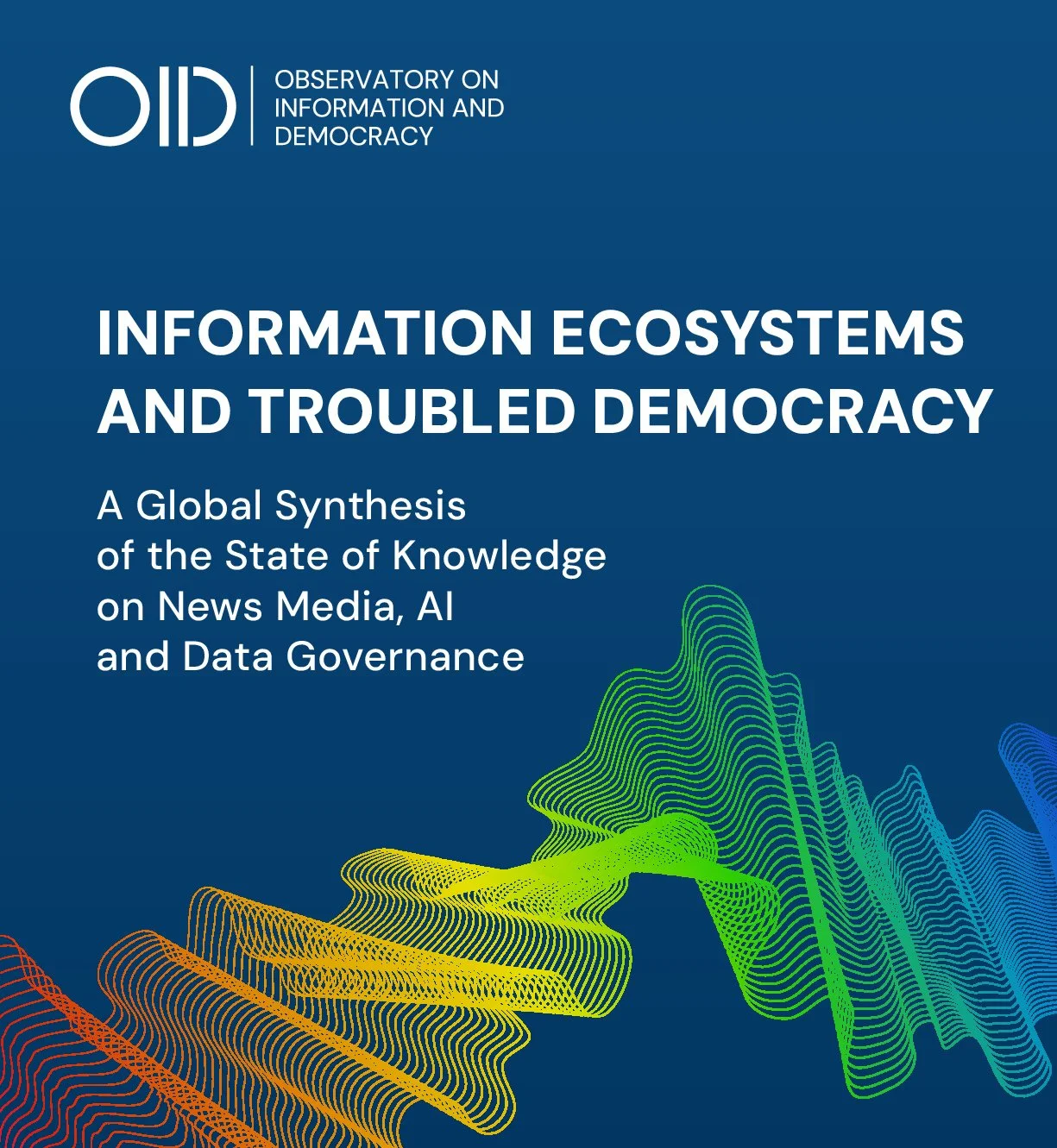The Center for Journalism and Liberty at Open Markets Welcomes the Release of The Observatory on Information and Democracy’s Global Assessment of Information Ecosystems
Open Markets congratulates CJL Director Dr. Courtney Radsch for her leadership of the report’s steering committee
Following Meta’s radical content policy shift, the publication is a wake up call on the urgent need to address corporate and regional power asymmetries to govern and improve information ecosystems
The Center for Journalism and Liberty welcomes the publication of a landmark report, “Information Ecosystems and Troubled Democracy” by the Observatory on Information and Democracy. This landmark document analyzes the most current academic research on information ecosystems and their impact on democracies worldwide.
Center for Journalism and Liberty Director Dr. Courtney Radsch was honored to chair the report steering committee and spoke about the report’s important lessons for policymakers, journalists, and advocates at a press conference yesterday previewing the report’s launch.
“This ambitious new analysis combines for the first time the political economy of our information ecosystems, where problematically, a handful of powerful corporations dominate decision-making, with a global, academic analysis of contributors to dis- and mis information, said Dr. Courtney Radsch, director of the Center for Journalism and Liberty at Open Markets. “This report is a wake up call for policymakers and journalists: focus less on the decisions of Big Tech CEOs and more about the systemic changes needed to fix our information ecosystems, including by addressing concentrated corporate power.”
Based on a collective review of 2700 publications compiled by a global network of 400+ experts covering 84 countries and including both academic and civil society perspectives, the report covers issues such as media, politics and trust, the impact of AI on information ecosystems, and data governance. It shows how disinformation is both a phenomenon and a cause of democratic backsliding.
The report’s findings stress the urgency to tackle regional, scientific and corporate powerasymmetries to effectively govern information ecosystems. Following Meta’s radical content policy shift, this timely publication is a wake up call that policy action must be guided by evidence rather than corporate opportunism.
Report Findings:
The Need for Global and Inclusive Perspectives and Data Transparency: The report highlights gaps in research, including a strong Western bias, limited access to data from tech companies, limited research from the Majority World, and a lack of focus on structural power dynamics.
Towards Data Justice: The report advances the concept of data justice - referring to the fair and equitable treatment of individuals and communities in how data is collected, used, and shared - against corporate-driven unfair data practices. The monetization of data for profit by Big Tech business models undermines public trust and facilitates the weaponization of information. The study underscores power asymmetries between tech corporations and online users and advocates for equitable access to data and a fairer distribution of resources and influence in shaping global information systems.
A New Lease on Mis- and Disinformation: Existing literature points to a focus of media and policy attention on the causality effect between disinformation and political polarization, while evidence gathered fails to establish this link scientifically.. The report calls for addressing the structural, institutional, and power dynamics underpinning these issues rather than relying solely on content moderation, algorithmic fixes, or media and AI literacy, although those are also important. These findings also call for research independence and gatekeepers against corporate influence, given online data and academic resource scarcity, as well as recent attacks on researchers.
A Tool for Decision-Makers and a Call for Global Collaboration
Targeted at policymakers, researchers, civil society actors, and big tech companies, the report aspires to become a reference guide, akin to the IPCC in the field of climate science. Grounded in robust scientific evidence, it provides a framework for concrete actions to safeguard democracies in the digital age.
Aligned with the UN’s Global Digital Compact, the report underscores the need for
evidence-based policies addressing harmful content, rooted not just in individual
impacts but in systemic challenges like monopolistic market structures and data
monetization. It advocates for collective, global efforts to reimagine data governance and
contest dominant digital system designs.
The report calls for structural reforms, stakeholder collaboration, and investment in
independent media to foster a more equitable, inclusive, and resilient information
ecosystem. It provides a roadmap for policymakers, tech leaders, and researchers to
address the challenges of the digital age with actionable solutions.

